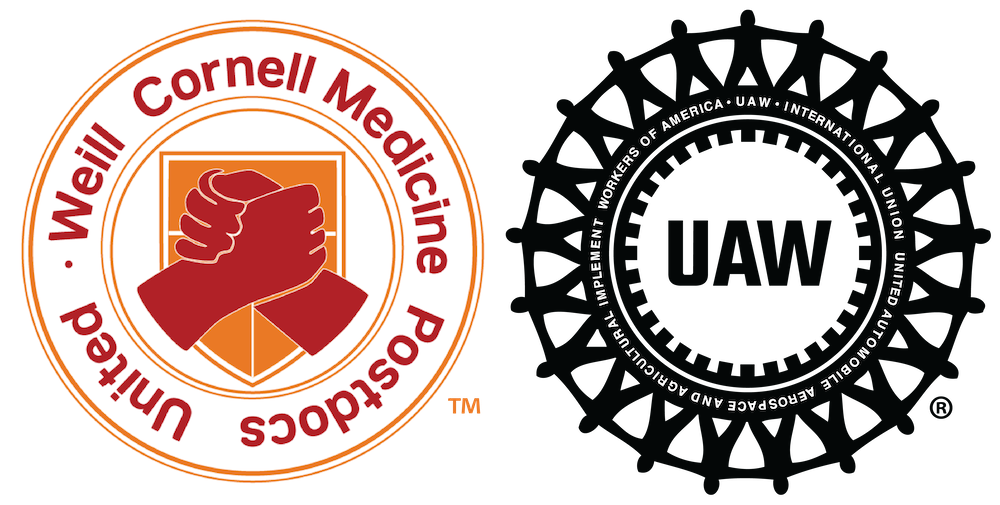We Won Our Union!
We have a clear choice in this election. Voting “YES” means WCM administrators would have a legal obligation to bargain with our elected postdoc representatives over pay, benefits and workplace rights, and to secure any agreements on improvements or maintaining current benefits in a legally binding and enforceable contract. We will be joining 100,000 UAW academic employees in working together to make research workplaces more just, fair, and equitable including postdocs at Columbia University and Mount Sinai in NYC.
Over the course of hundreds of conversations, we’ve seen that WCM Postdocs share many of the same challenges. These include increasing bureaucratic hurdles for international workers, unpredictable salary increases that don’t match the skyrocketing cost of living in New York City, lack of paid parental leave, and insufficient recourse for sexual harassment, discrimination, and bullying. These challenges add unnecessary stress to the postdoc experience and make it more difficult to focus on doing quality research.
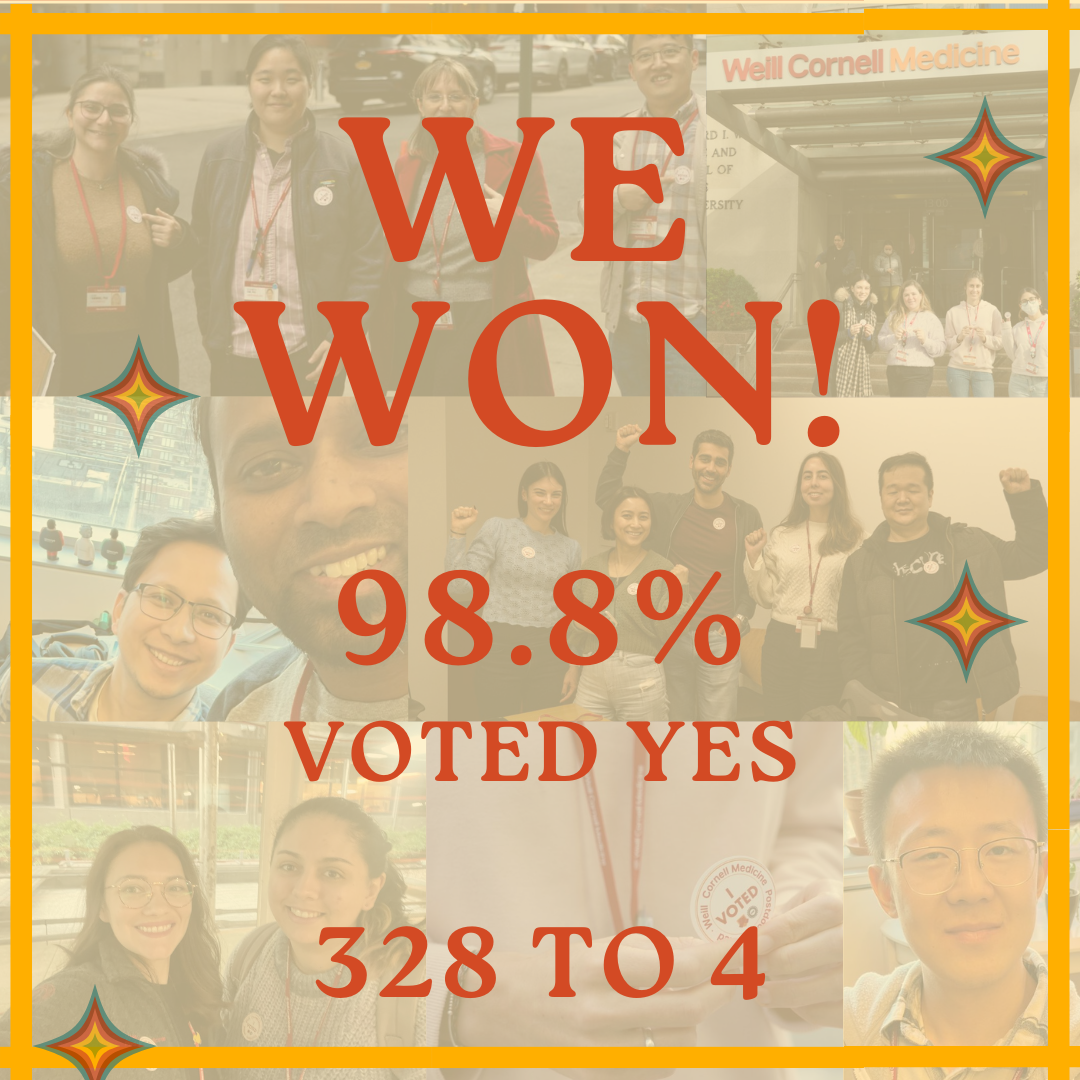
Right now, WCM administrators decide unilaterally if, how, and when to address problems affecting postdocs. With collective bargaining, we will be able to meet at the bargaining table as equals. With strong participation and support in our vote we can negotiate a contract that not only improves our pay, benefits, and workplace rights, but also ensures the security and stability that enables us to do quality research. With the continuity of a certified union, we can project our voices beyond the campus and build a more connected community within it.
In hundreds of conversations, and in town halls and other meetings, postdoctoral researchers have already identified some of the common priorities that we could address through a contract.
Fair workplace standards enable postdocs to prioritize research.
As postdocs, our work powers WCM’s research mission — we make valuable contributions that have earned WCM international renown and bring in the funding that supports day-to-day operations. We do it in the most expensive city in the country and in the face of generationally-high inflation.
In 2020, postdocs at Columbia approved their first union contract and took their minimum salaries from the lowest for postdocs in New York City to the highest In doing so, they helped raise the standard for other NYC institutions. It is time for us to come together and demand salaries and other benefits that reflect the value of our contributions, and to secure them in a contract, so we can focus on the quality of our research instead of how to make ends meet.
How have other postdocs used a union contract to improve compensation?
University of California postdocs have negotiated the highest pay of any public university postdocs.
“The first ever postdoc union at a private US university has been formed”
See the positive results of collective bargaining for other UAW academic workers
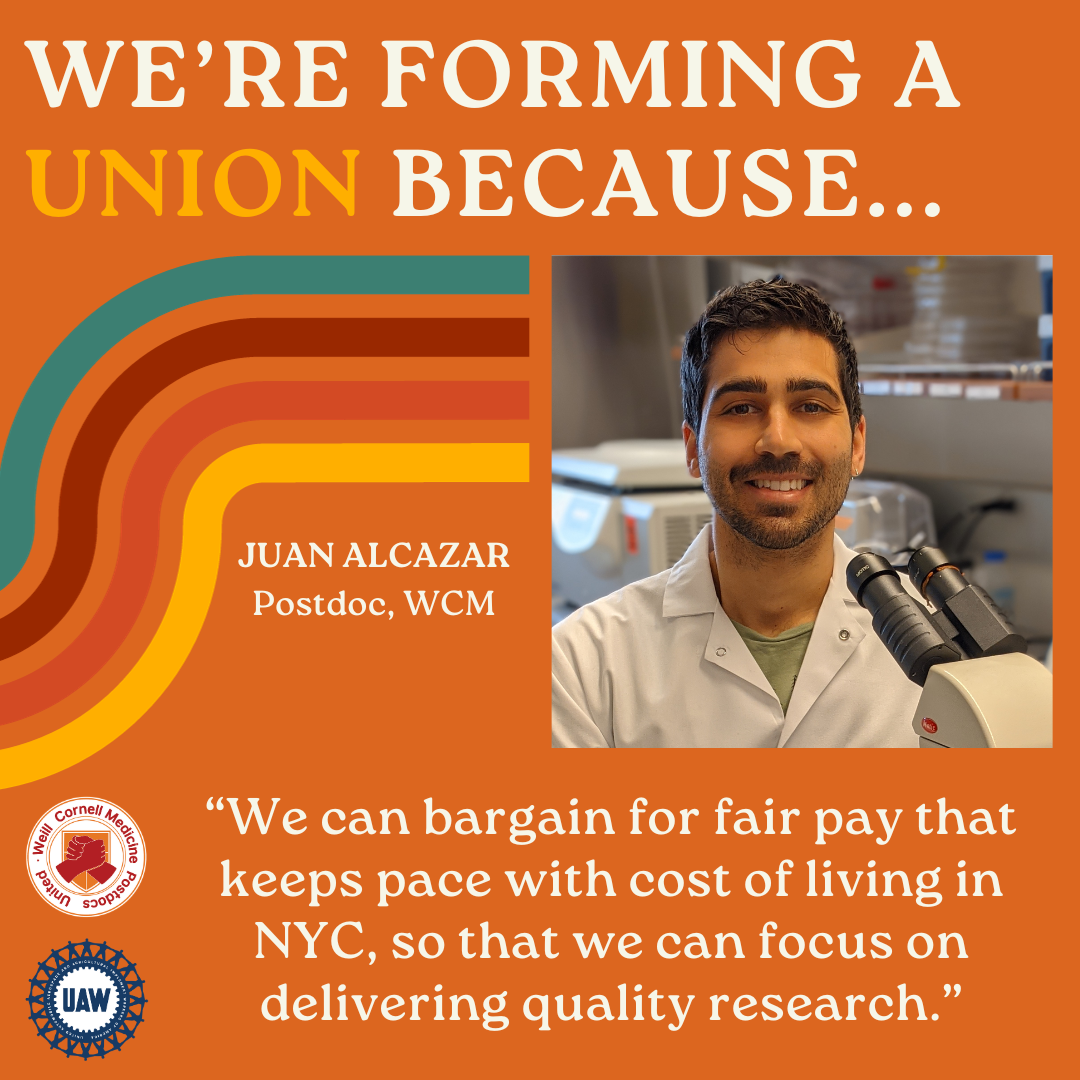
Collective bargaining can create a more accessible postdoc experience.
As postdocs, many of us spend upwards of 50 hours a week in the lab. And because of the high cost of living and housing, many of us, especially those with children, are constrained in our choices for where and how we live in NYC, without any guarantee of improvements to our pay and benefits that track the increasing experience and value that we bring to our labs and the school. Standing together we can demand better support and negotiate changes that improve our access to institutional housing.
How have postdocs at other institutions used a contract to improve the postdoc experience?
Read about the growth of postdoc unions in Inside Higher Ed
Read about all the improvements UC postdocs have negotiated to improve and stabilize their work

A stronger voice to advocate for International Worker rights.
With 100,000 academic workers across the US, including postdocs, RAs and TAs, and non-tenure-track faculty, the UAW nationally and locally has become a leading voice advocating for expanded opportunities for international students to transition to early-career research positions in the US after graduation and for robust federal investment in science research. UAW academic workers’ advocacy work also played a key role, alongside others like NIH director Francis Collins, ensuring the inclusion of postdocs in the 2016 federal overtime rules that established significant improvements to postdoctoral salaries.
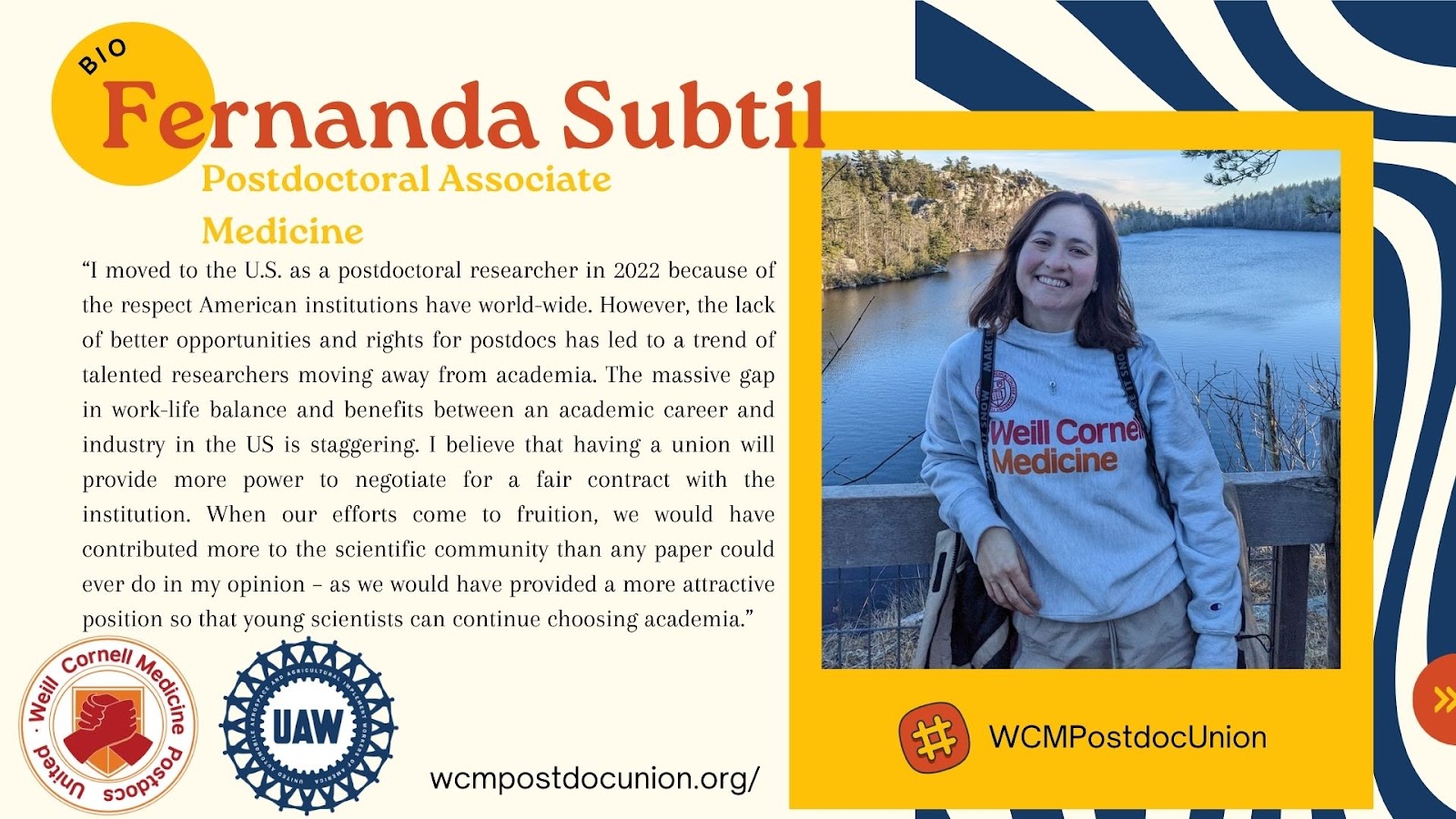
The UAW’s commitment to international researchers and scholars stems from the leadership of international researchers and scholars themselves. Postdoc and graduate employee unions affiliated with UAW are often led by international students and scholars, who serve in top leadership positions in local unions nationwide.
Joining together with other academic workers in the UAW has become more urgent than ever as recent government actors have waged unprecedented attacks on science, sexual harassment protections, and the rights of international scholars.
Letter to the editor: UAW is a strong ally for international students and postdocs
As International Researchers at Columbia University we are voting Yes for our Union
Read about UC postdoc and UAW efforts to support federal science funding
UAW 5810 Resolution To Mt. Sinai Postdocs on International Researcher Rights
Our research is stronger when everyone can contribute.
Pregnancy, childbirth and adoption should be occasions for celebration – without unnecessary stress caused by having to return to work too soon after giving birth, or concerns about unstable benefits, housing, or visa status. Unfortunately, this kind of stress is all too prevalent for postdoc parents. More women are obtaining Ph.D.s in science than ever before, but those women — often due to discrimination and unequal pressures on postdocs choosing to have a family — are far more likely than men to leave academia before obtaining tenure at a college or university.
Under-representation of women in senior roles has been a longstanding problem within academia, and that’s why winning significant improvements in this area is so important.
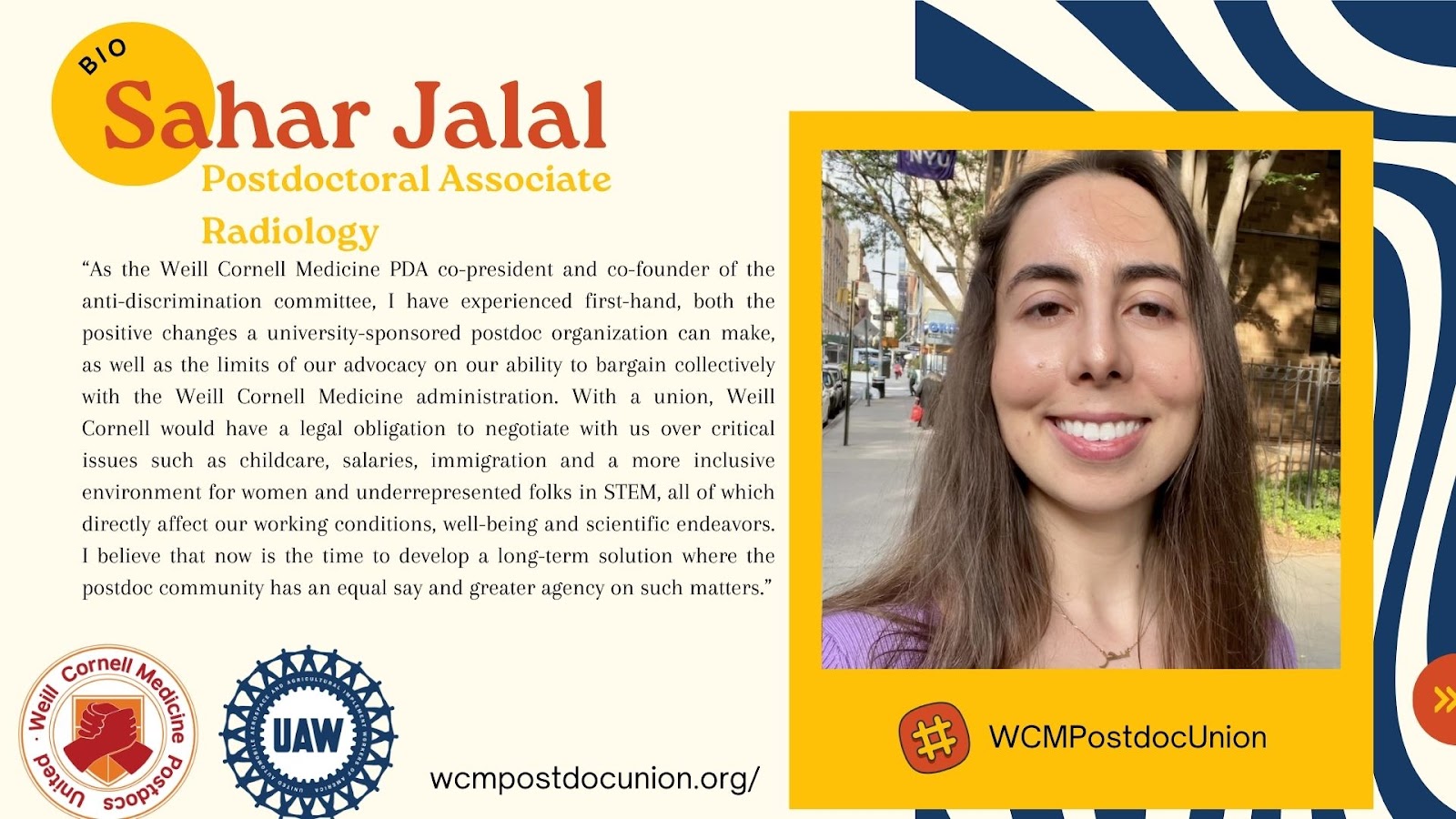
Read how other postdocs have unionized and made their employers more family friendly.
Why Columbia postdoc parents voted “YES” for a more family-friendly research community
Columbia graduate workers win fully-paid dependent health insurance
Columbia Postdocs Win Emergency Child Care Subsidy During Pandemic
Together we can make WCM more equitable and inclusive.
Inequalities — including those based on gender, race, sexual orientation and immigration status — continue to create barriers for many of the most talented to enter the academic and scientific workforce. And existing systems of recourse for problems like discrimination, harassment, and bullying too often fail and can take years. Though much work remains to be done, postdocs, graduate students and adjunct faculty in the UAW have helped make progress on many of these issues, both at the bargaining table and in policy advocacy through the UAW. At the University of Connecticut, for example, a graduate assistant worked with her union to successfully resolve a major sexual assault and harassment complaint in three months.
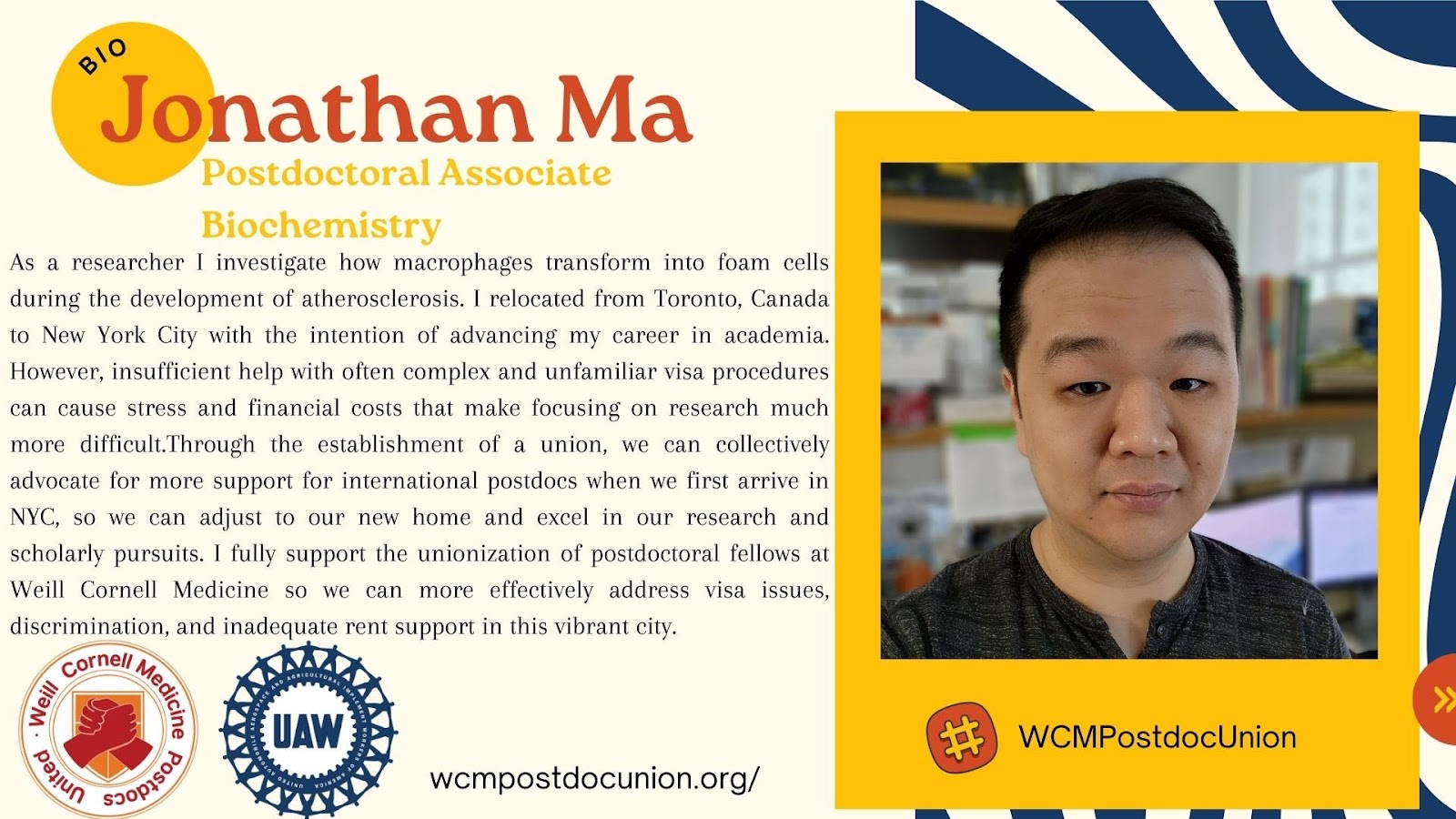
Discrimination Lawsuit Against Mount Sinai Health System Moves Ahead
UConn Graduate Student Union Helps Handle Sexual Harassment
Columbia Postdoc Union Develops University-Wide Anti-Bullying Policy
“Workplace Bullying in Higher Education is Rampant. We’re Fighting Back”
UC International Postdoc Takes on Pregnancy Discrimination and Wins
